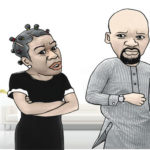WHAT was growing up like?
I grew up during the apartheid years in South Africa, so life was tough for me as a Black girl living in Soweto. I came from a working class family, and sacrifices needed to be made in order to keep the family going. I was fortunate, however, that my parents were firm believers in the value of education. They saved and sacrificed to send my brother and I to private school, which opened my eyes to possibilities beyond the circumstances I was born into.
Journey into medicine
I did well at school, and I wanted to make a difference. So, when I was in high school I decided I wanted to be a doctor. I enrolled at the University of Cape Town, first for a Bachelor of Science degree and then Medicine. I loved studying, and when I graduated I anticipated having a long and successful career as a doctor. Unfortunately, my career didn’t work out that way.
What attracted you to the medical profession?
As an intelligent and hardworking young woman, I felt that Medicine was the best way I could apply my gifts while making a difference in the lives of my patients. That drive is still alive in me, which is what made walking away from the profession so difficult. I now appreciate that I am continuing to make a difference in the healthcare sector, only in a different way to what I had originally envisaged. Sharing my story and speaking up about the challenges that doctors face has opened up an important conversation about the state of our healthcare system and how it impacts the people who work in it. We are now in a position to begin to address the issues so that doctors thrive in Medicine, instead of merely surviving.
In 2004, you left clinical practice for good. It’s been 14 years now. If you could go back to 2004, would you do anything differently?
I have no regrets about how things have turned out. I think writing my book helped me to derive value from the challenges I faced. In a way, I feel that it was meant to be. If I hadn’t gone through what I went through and then written about it, the challenges that doctors face might have stayed “under wraps”.
Have you had offers to come back to the practice?
People have suggested that I pursue a leadership position within the medical sector. My response to them is that leadership isn’t a position. I am providing leadership around the issue of doctor burnout and well-being, and I am doing it in a way that speaks to my strengths and interests.
When you decided to write Postmortem: The Doctor Who Walked Away, did you expect the impressive feedback?
No, I was concerned that there would be a backlash from the medical fraternity. While there has been resistance in some quarters, the response has been overwhelmingly positive. I think the reason for this is that I shared my experiences with honesty and humility, and I took responsibility for the decisions I made. I didn’t blame the medical profession for the end of my career; I simply outlined some of the factors that influenced my decision.
The book was long overdue; many doctors have contacted me to thank me for finally bringing these issues out into the open.
It is sometimes assumed that since science and arts seem like two extreme sides of a divide, doctors make terrible writers. Considering your medical background, did you find writing challenging?
Doctors make great writers! The practice of Medicine exposes you to life at its extremes, from birth to death and everything in between. Doctors listen to the stories of their patients on a daily basis, and they witness tragedies, triumphs and even miracles. Doctors are therefore attuned to storytelling, and putting pen to paper follows from that.
In writing my memoir I wanted to reflect on my medical career and the reasons I chose to walk away from it. It was a cathartic process, and I’m grateful that it has also served to raise awareness about the challenges that doctors face.
Being a doctor, a coach and an author, have you ever been treated differently because you’re a woman?
I think as women we aren’t taken seriously. When I was working as a doctor I had a number of patients refuse to be treated by me because I was “a little girl”! I have learned that being excellent at what I do quickly shuts the critics up.
In Nigeria, doctors and other medical personnel go on strikes. With your experience coaching doctors, what ways do you think such incessant protests will affect the healthcare system negatively?
Doctors going on strike is a difficult issue. On the one hand, they have valid grievances that they want to voice, and on the other, they have a duty to care for their patients. No-one goes to medical school with the intention of abandoning their patients and going on strike. I think it would be valuable to view strikes as a desperate attempt by doctors to be heard.
So yes, doctors going on strike negatively affects the healthcare system. The other side of the coin is that a dysfunctional healthcare system that doesn’t look after its people drives protest action. In both these cases, patients suffer.
What ways do you think the government can ensure the improvement of the health sector?
This is a huge question and there are no simple answers. I don’t think the focus should be about improving the health sector in isolation. The question we should be asking ourselves is: what is it going to take to improve the health of the nation? That needs a multi-sectoral approach, which includes health, education, housing, sanitation, economic development, etc.
At 45, many people would envy your accomplishments. Tell me something about you people may find incredible.
When the writing bug bit in 2012, I not only wrote my memoir but also wrote a novel aimed at young teens. The book, titled “Second Chances”, won the Maskew Miller Longman Literature Award.
Advice for women in the medical profession on being the best in the field.
Pursue the specialities that interest you. Interest promotes engagement, which drives the rate of skill acquisition and the successful achievement of your career goals.







